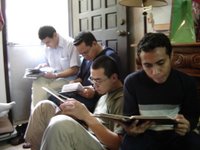
16 March 2006: Thursday of the 2nd Week of Lent
Luke 16, 19-31: Lazarus and the Rich Man
The Gospel is a study in contrast. First, there is the rich man, usually called Dives, which is the Latin for rich. He was dressed in purple and linen, the robes of the High Priests and feasted in luxury everyday. In today’s language, Dives was filthy rich: his clothes were expensive and he dined luxuriously, having taste for fine food and gourmet dishes. At the time of Jesus, there were no knives, forks or napkins. Food was eaten with the hands, and in the very wealthy houses, the hands are cleaned by wiping them on hunks of bread, which were thrown away. That was what Lazarus was waiting for. On the other hand, Lazarus was a beggar covered with sores and was so helpless that he could not even ward off the street dogs. The Latin word for Lazarus was a form of Eleazar which means, “God is my help.” Then, the scene changes when both Dives and Lazarus die. Dives was still the exact opposite of Lazarus but their fortunes were reversed: Lazarus was glorified while Dives was tormented; Lazarus was in heaven while Dives was in hell.
What was the sin of Dives? Dives did not order Lazarus to be removed from the gate. He did not object to Lazarus’ receiving the bread that was thrown away from his table. He did not harass Lazarus, and was not cruel to him. Thus, the sin of Dives was not that he did wrong things, but that he did nothing. Today, we call it the sin of omission. A beggar knocks on our window shield, we did not give anything. A dormer cries in her room, we did not do anything. We see a classmate cheat, we shrug our shoulders and say to ourselves, “That’s life”, and we never say a word about it to the teacher. There are certain things in life which we have accepted and tolerated: cheating in high school is considered normal, graft and corruption for government officials are regarded as common practice and apathy towards national issues are considered part of the landscape. Many of the worst things happening to our personal and national lives are attributed to us and our leaders for not doing anything; to not getting things done.
It would be best if we see some concrete examples. In the middle 1990s, the traffic jams in
Thus, if the crime of Dives is not doing anything, and if the crime of our Philippine leaders is not getting things done, then we should be its opposite: as Filipino Christians, we should be leaders of execution, of getting things done. We Filipinos are well-known for being very good at planning workshops and at formulating resolutions and equally well-known for not seeing them through. Marami na tayong planong walang nangyari, kasi wala tayong nagawa o ginawa. Naunahan na tayo ng takot sa mga magiging problema. Paano natin maihahanda ang ating sarili? How do we prepare if we are to focus on executing and doing things done? We live in our lives in concentric circles. There is an outer circle were we live our roles, our work, our profession. There is an inner circle of family and close friends. If we are fortunate, we live our life there with much support, meaning and fulfillment. Their love is constant. There is an innermost circle which is God and us. God is intimior intimo meo, says St. Augustine, more inner to me than my innermost self.
In the years to come, I hope that we might constantly remind ourselves that who we are and what we are worth is ultimately not in the outer circle of role, achievement, economic status, but in the inner circles of family and God. If we learn this valuable lesson, mananatiling buo ang loob natin, and thus whatever tensions and conflicts may come in doing something--- unlike the rich man --- then we will be able to actively participate in the fulfillment of our plans.
*photo by Neo Saicon SJ

No comments:
Post a Comment